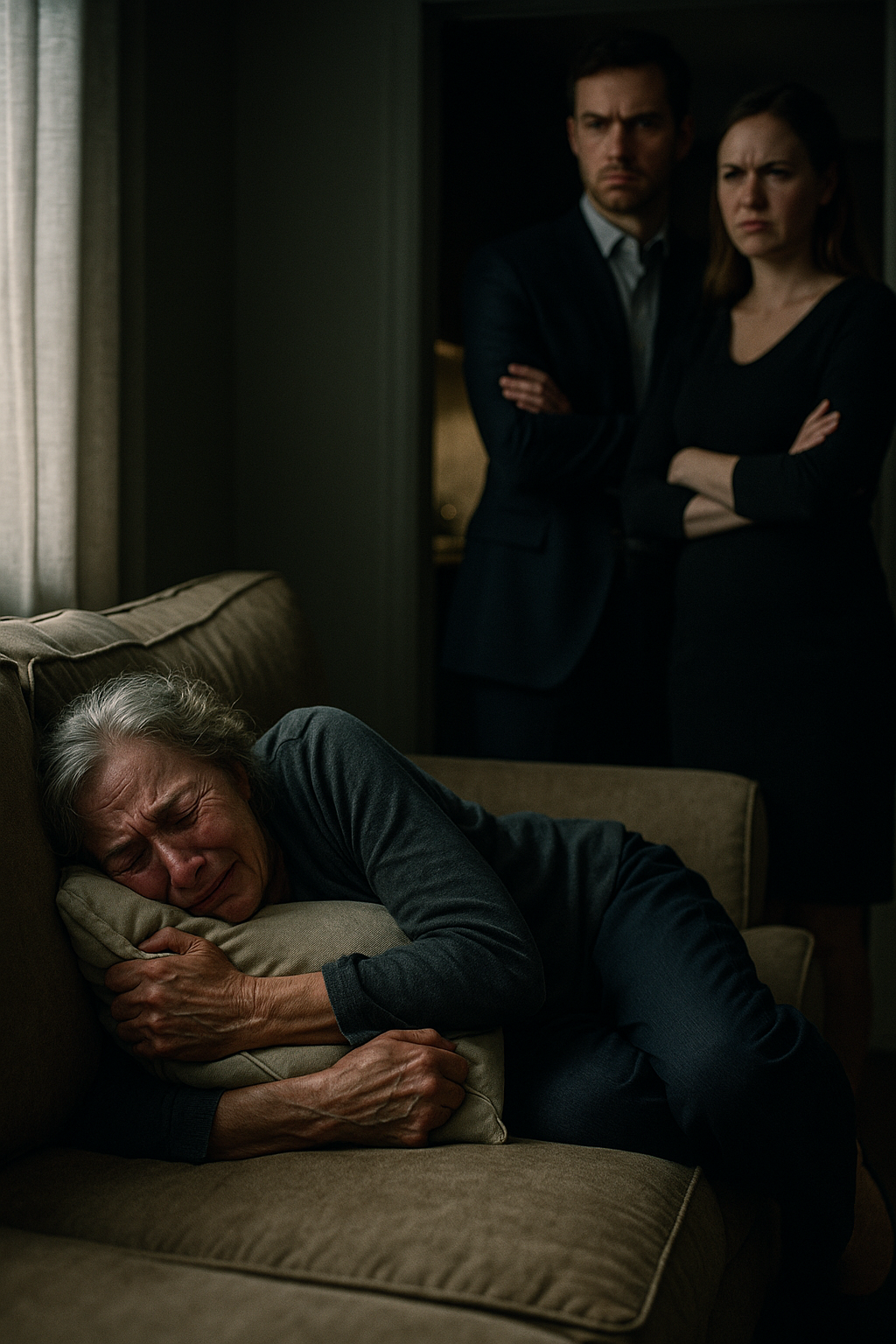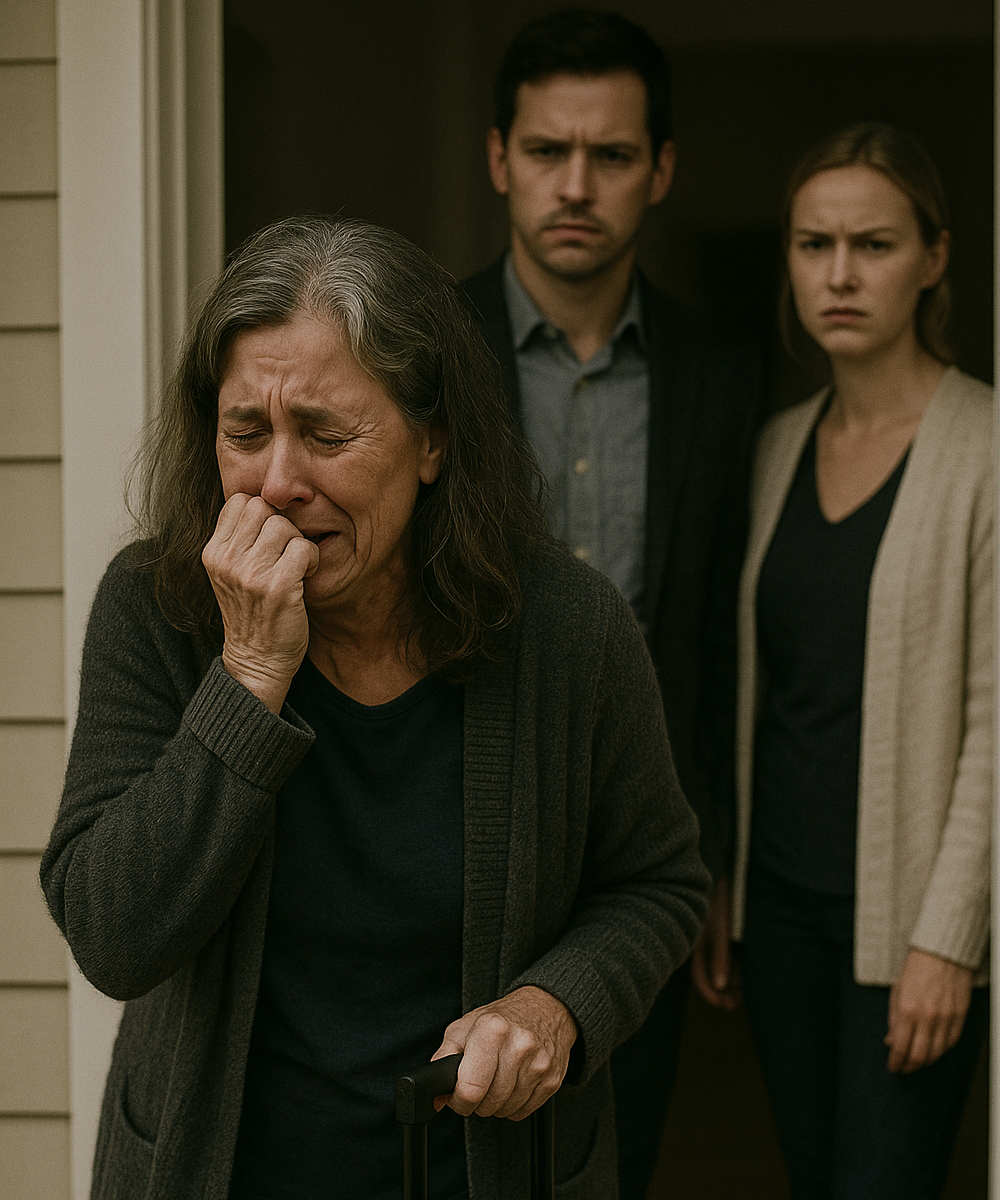The couch had shaped itself to my back after three long weeks of restless nights.
I pressed my face deeper into the rough fabric, breathing in the faint mix of Marvin’s aftershave and Dorothy’s vanilla candles. It was the scent of a life lived on the edges.
Through the paper-thin walls, I could hear them talking—about me—like I was a situation to be managed, not the woman who had carried Marvin into this world.
At sixty-two, I never imagined ending up here: sleeping in my son’s living room, my entire life condensed into two worn suitcases. My divorce papers were still warm from the lawyer’s printer when Marvin called this arrangement “temporary.”
Temporary, as if the end of a thirty-year marriage was just a brief inconvenience.

Morning light slipped through Dorothy’s spotless white curtains, painting shadows on the hardwood floor I wasn’t allowed to walk on with shoes.
The rules in this house weren’t written down, but they were carved into the air: no using the good towels, no touching the thermostat, and no cooking anything that left a smell.
I had become a ghost in their perfect little world.
“Mom, you’re up early,” Marvin said, leaning in the kitchen doorway in his crisp charcoal suit. Thirty-five years old, with his father’s sharp jawline and my stubbornness—though he seemed to have forgotten the source.
“Couldn’t sleep,” I said, making instant coffee with water I’d microwaved. The real coffee maker was “off-limits”—a wedding gift, Dorothy had explained with a tight smile.
“Dorothy and I were talking,” he began, his voice careful. “We think it’s time you start looking for something… more permanent.”
I set my mug down. “More permanent?”
“There are senior living communities. They’re nice, lots of programs.”
“Of course,” I said flatly. “How silly of me to think I could stay here until I got back on my feet.”
“Don’t be like that, Mom. We want to help.”
“Help?” I asked quietly. “Yesterday, you drove Dorothy’s mother to see that brand-new building on Maple Street. The one with granite counters.”
“That’s different. Her mom has specific needs.”
“My specific need is a bed that’s not your couch.”
Dorothy entered, hair pulled into a perfect bun.
“Good morning, Martha,” she said without looking at me — a reminder I wasn’t family, just a long-term guest.
The spare bedroom had been cleared for the nursery. Dorothy was barely showing, but the crib was already ordered.
“Dorothy needs that space for the baby,” Marvin explained.
“I wasn’t asking for it forever. Just until I can find my own place.”
Dorothy’s cool green eyes met mine. “Martha, this is about boundaries. About what’s appropriate.”
“Appropriate?” I repeated slowly. “And what’s appropriate for a woman whose husband of three decades decided he wanted someone else?”
“Mom, no—”
“Let me be clear, Marvin. Your unborn child deserves their room, and your mother deserves your couch. Is that right?”
“You’re not homeless,” he said stiffly. “Dad offered you the condo in Florida.”
“He offered me a one-bedroom two thousand miles away if I gave up my rights to half of what we built together. Very generous.”
Dorothy’s blender roared to life, drowning the room in noise. When it stopped, Marvin’s voice came quiet:
“If you wanted comfort, you should have stayed married to Dad.”
The words landed like a slap. I stared at my son—the boy I had raised—and saw someone else. “I see,” I said softly. “Thanks for making things clear.”
That night, I counted my savings: $847 in checking. No job. No credit. At sixty-two, it might as well have been eight dollars.
I walked to the corner market for milk but found myself staring at the lottery stand instead. The jackpot was $300 million.
“One quick pick,” I heard myself say.
Back home, the apartment was empty. At 11:17 p.m., the winning numbers rolled across the TV screen. My heart pounded. I checked my ticket. Once. Twice. Every single number matched.
Three hundred million dollars. After taxes, more than enough to never sleep on anyone’s couch again—and to decide exactly how I wanted to handle my “tough love” son.

The next morning, I pretended nothing had changed.
“I’ll start looking at places today,” I told them over coffee. “Might even have some good news tonight.”
Instead, I went to the lottery office, claimed my winnings, and headed to the library to look at real estate. By evening, I’d found it: a forty-acre farm with a main house and a small caretaker’s cottage. Remote, private, and full of potential.
Three weeks later, I was standing in my own kitchen, the morning sun flooding in.
The barn was repaired, and the fences rebuilt. The caretaker’s cottage had been fixed up, ready for someone who needed a “temporary place to stay.”
I filled the farm with rescued animals and hired Gloria, a young veterinary student, to help. She lived in the cottage in exchange for a modest salary.
I hadn’t spoken to Marvin in six weeks.
Then I saw a post on his LinkedIn: Exploring new opportunities. Which meant he’d been fired.
Two months after I’d disappeared, he arrived.
“Mom,” he called across the pasture. “You just… vanished. And now you’re here?”
“This is my home,” I said simply. “These are my animals.”
“Where did you get the money?”
“The same place anyone gets it. I earned it.”
“You haven’t worked in thirty years!”
I met his eyes. “I’ve been working my whole life. I just wasn’t getting paid.”
He shifted uncomfortably. “We… we need help. The apartment’s gone. We have nowhere to go.”
Dorothy, visibly pregnant now, stood beside him. “Think of your grandchild.”
I looked at them both, then smiled faintly. “Gloria,” I called, “show our guests to the cottage.”
It was small, old, and plain. “It has everything you need,” I said. “Water, heat, and a roof.”
Then I gave them the rules: 5 a.m. start time, no visitors, no alcohol, and everyone works.
“Dorothy’s seven months pregnant!” Marvin protested.
“Then you’ll work twice as hard. Or you can find somewhere else.”
Six months later, Marvin’s soft hands were calloused from mucking stalls and repairing fences.
Dorothy kept the farm’s books with precision. The arrogance was gone. The lessons had stuck.
One morning, Dorothy brought me a lease agreement. “We want to stay. As farm managers. For housing and a small salary.”
“Why?” I asked.
“Because you gave us more than shelter. You gave us the chance to become better people—people our son can be proud of.”
I glanced toward the barn, where Marvin worked steadily.
“Tell him,” I said, “that I’m more interested in the man he’s becoming than the man he used to be.”
